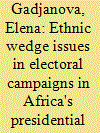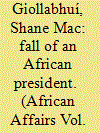|
|
|
Sort Order |
|
|
|
Items / Page
|
|
|
|
|
|
|
| Srl | Item |
| 1 |
ID:
154516


|
|
|
|
|
| Summary/Abstract |
SINCE OCTOBER 2016, the North West and South West regions of Cameroon have been brought to a standstill by strikes and protests. First led by lawyers and teachers defending the special status of law and education in these English-speaking or anglophone regions, the protests spread to the entire population. Following calls for ghost towns (villes mortes), entire towns, cities, and villages in the anglophone regions came to a standstill as schools were closed, banks and shops were not opened, and even taxis were not operating. The most drastic reaction of the government, cutting down access to internet in the two concerned regions from January to April 2017, received attention all over the world. While both sides have walked out of negotiations, the government has reacted through repressive measures. Federalism and even secession of the two regions, under British trusteeship until 1961, have come to dominate the protesters’ discourse, widening antagonisms between the protesters and the government.
|
|
|
|
|
|
|
|
|
|
|
|
|
|
|
|
| 2 |
ID:
154514


|
|
|
|
|
| Summary/Abstract |
Formulating ethnic wedge issues is an important, yet overlooked, strategy for cross-ethnic mobilization in Africa's presidential regimes where coalitions are needed to win elections. Ethnic wedge issues are rhetorical tools intended to splinter the support of a key opponent by employing narratives of ethnically motivated discrimination, victimization, or exclusion, and promising remedial action. They are often put forward by challengers and target minorities within incumbents’ coalitions for whom ethnicity is salient, who vote as a bloc, and who are a regional majority. Ethnic wedge issues can inflame ethnic resentments, entrench existing conflicts, and limit the space for compromise on contentious issues. Drawing on an analysis of recent presidential campaigns in Kenya and Zambia, this article illustrates the logic of the use of ethnic wedge issue appeals, as the salience of ethnicity varies within countries. It contributes to the growing literature on parties’ voter outreach strategies in sub-Saharan Africa. The research has implications for the continued salience of ethnicity in plural societies and for the structure of political cleavages in Africa's democratizing states.
|
|
|
|
|
|
|
|
|
|
|
|
|
|
|
|
| 3 |
ID:
154509


|
|
|
|
|
| Summary/Abstract |
The entry of the ANC into the arena of democratic politics provoked a dilemma for the party leadership that is familiar to political parties in a new democracy: how, if at all, should the party reform its internal organization to compete in a new electoral environment? This article draws on interviews with senior members of the ANC to develop a theory that describes how the ‘modernization’ of the ANC under President Thabo Mbeki led to his electoral defeat at the party's national conference in 2007. It contends that the process of modernization reduced systematically the role of the party's activist base in the policy-making process, creating a motive to replace the President, but left intact the role of activists in the selection of the party's leadership, which in turn provided an opportunity to replace the President at the party's national conference. The President's opponents exploited ruthlessly this opportunity by enlarging and mobilizing the party membership, using a clientelistic appeal for support, to deliver a resounding victory for their champion, Jacob Zuma. This type of clientelistic competition, which has become routine inside the ANC, undermined the democratic legitimacy of the party and its capacity to govern in the public interest.
|
|
|
|
|
|
|
|
|
|
|
|
|
|
|
|
| 4 |
ID:
154513


|
|
|
|
|
| Summary/Abstract |
This article shows how bureaucratic discretion in the implementation of Nigeria's power-sharing institutions, the Federal Character, has led to the formalization of local informal norms on belonging. Under the Federal Character, Nigerians have to be ‘indigenes’ to access certain economic and political opportunities at the federal as well as state and local government levels. However, what makes a person indigenous is not formally defined, leaving street-level officials free to decide how to allocate indigeneship certificates. Using original qualitative and quantitative data on Kano, northern Nigeria's largest city, this article shows that local officials faced with this discretion often turn to locally salient norms on belonging. In Kano, several of these norms set ethnic and religious criteria for belonging, particularly those that prioritize the rights of the ‘native’ over those of the citizen. The article demonstrates how street-level bureaucrats use these ethnic and religious criteria to allocate indigeneship certificates, prioritizing Kano's ‘natives’ over other Nigerian citizens. This dynamic may be mirrored across Nigeria, depending on the norms on belonging that are locally salient. While the article suggests a simple technical solution – formally defining indigeneship on the basis of residence – it also shows the deep political barriers to its implementation.
|
|
|
|
|
|
|
|
|
|
|
|
|
|
|
|
| 5 |
ID:
154511


|
|
|
|
|
| Summary/Abstract |
This article investigates patterns of manufacturing sector development in Angola since the end of the civil war in 2002 and shows that emerging forms of manufacturing production in Angola come out of a process of domestic-market formation, in other words an increase in domestic demand. Domestic-market formation was partially supported by economic engagement with China, because Chinese contracted projects increased demand for building materials, while increased export demand from China allowed for higher volumes of capital goods imports. In addition, the anticipation of a growing consumer demand base in the wake of the China-fuelled oil price boom attracted increasing volumes of foreign and domestic investment in food and beverages production. This article shows that China's impact on manufacturing sector development goes beyond export-oriented light manufacturing, but also reveals broader challenges to late industrialization. At face value, statistics seem to suggest progress in terms of manufacturing sector growth, even if the latter remains in the shadow of the much larger mining sector. Yet, the Angolan case also illustrates the importance and difficulty of maintaining a growing domestic demand base.
|
|
|
|
|
|
|
|
|
|
|
|
|
|
|
|
| 6 |
ID:
154510


|
|
|
|
|
| Summary/Abstract |
International organizations are increasingly paying attention to the problem of sexual violence. One outcome of this attention has been the adoption of instruments that call on states to punish perpetrators of rape and end impunity for this crime. The reporting of rape to law enforcement agencies is key to formally holding perpetrators accountable. This article examines the influence of police officers and gendarmes and of social forces on survivors’ decision to report rape in post-conflict Côte d'Ivoire. It also investigates the challenges that confront those who choose to seek redress from the state. It argues that the Ivorian conflict contributed to fostering a preference for redress from the state over informal justice mechanisms. On the other hand, the blaming and shaming of rape survivors was pervasive and discouraged them from reporting. Support from friends and relatives increased the likelihood that survivors would report rape but negative social reactions had adverse psychosocial effects on them. The article explores the implications of these findings for ending impunity and for post-conflict gender relations.
|
|
|
|
|
|
|
|
|
|
|
|
|
|
|
|
| 7 |
ID:
154515


|
|
|
|
|
| Summary/Abstract |
The political settlements approach emerged out of a critique of new institutional economics developed by Mushtaq Khan in the 1990s. Since then, the political settlements approach has proliferated in donor programming and academic scholarship on African countries. This has led to some confusion about its core conceptual and methodological features. This Research Note starts by setting out our understanding of political settlements and provides an overview of existing political settlements literature on African countries. The note then explores how the key concept of ‘holding power’ has been employed in varied ways in the political settlements literature, which in turn has led to various methodologies to study power. The note discusses a number of these methodologies, including studying political ruptures as a window into analyzing the distribution of power in African countries, and emphasizes the importance of studying economic structure, ideology, violence rights, and rents as sources of holding power. The overall contribution of the note is to illustrate the varied strategies used in studying political settlements and to place them in conversation with one another.
|
|
|
|
|
|
|
|
|
|
|
|
|
|
|
|
| 8 |
ID:
154507


|
|
|
|
|
| Summary/Abstract |
Many cities in Africa have experienced building booms over the last 15 years. This article combines theoretical insights from the varieties of capitalism and varieties of residential capitalism literatures to examine the development of urban housing provision and real estate in Africa. It identifies two patterns of residential capitalism, the statist market economy and the hierarchical market economy types, and draws on a comparison of Luanda, Angola and Nairobi, Kenya to illustrate their respective differences. The two patterns reflect how governments, the private sector, and residents interact around the provision and purchase of housing in diverse political and economic contexts. The article suggests that the features of urban housing construction and real estate markets in the capitals of Angola and Kenya may serve as prototypes for broader patterns of capitalist development in these countries and elsewhere on the continent.
|
|
|
|
|
|
|
|
|
|
|
|
|
|
|
|
|
|
|
|
|